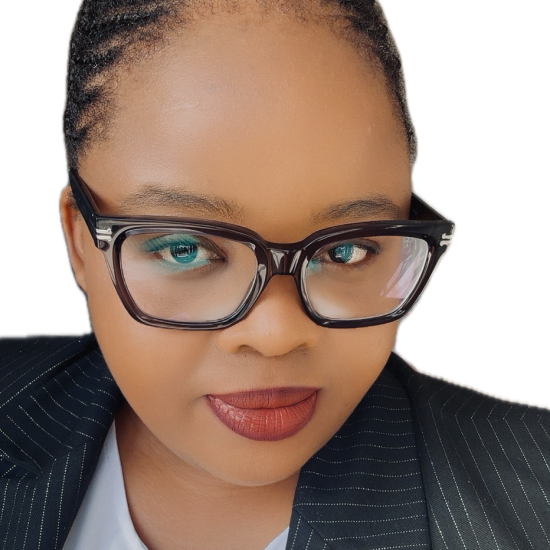Engineering academic trailblazer:
Dr Mabuwa’s remarkable journey

Dr Sipokazi Mabuwa’s journey from a rural upbringing to becoming a leading figure in mechanical engineering is nothing short of inspiring. As a Senior Lecturer at the University of South Africa (UNISA) with a Doctor of Engineering degree and a rapidly growing academic profile, she represents a new generation of South African scholars who are not only breaking barriers in their fields but are also deeply committed to uplifting others.
The 35-year-old, born and raised in in Willowvale, in the Eastern Cape, says she comes from a humble background, that was shaped by “love, resilience and community”.
Dr Mabuwa credits the women in her family, many of whom built careers in education, health, and domestic work, for instilling in her the values of education and faith. "School and church were non-negotiable pillars of life. I believe we were always given all the support, love and resources needed to succeed academically”.
Her interest in engineering was sparked in high school, driven by her strong performance in Mathematics and Science, and nurtured by the encouragement of a passionate teacher, Sibulele Mniki.
"She encouraged us to explore fields that were categorised as 'scarce skills' and went the extra mile by bringing us university application forms," she recalls. "As I explored my options, I became particularly drawn to mechanical and electrical engineering”.
Inquisitive mind
Her curiosity about why certain fields were male-dominated led her to mechanical engineering. "Coming from a household where gender roles were never rigid, I was curious to understand why certain careers were still seen through a gendered lens. That curiosity soon turned into determination”.
Mabuwa's academic journey began at the Cape Peninsula University of Technology (CPUT), where she earned her Diploma, Bachelor of Technology, Master of Engineering, and eventually her Doctor of Engineering in Mechanical Engineering. Each academic milestone became a promise to herself to continue pushing forward. "Every graduation ceremony became more than a celebration—it was also a moment of silent commitment”.
Her early professional roles at CPUT, including Computer Numerical Control Trainee, Metrology Technician, and Strength of Materials Laboratory Technician, laid a strong technical foundation. "These early experiences helped me gain hands-on experience with materials testing and mechanical processes, and understand the academic environment from a support perspective”.
In 2021, she transitioned into a lecturing role at CPUT, marking a turning point in her career.
"I started contributing to research publications, securing National Research Foundation grants, and supervising postgraduate students, which broadened my academic capacity”.
Her career later took her to Durban University of Technology (DUT), where she served as Senior Lecturer and acted as Head of Department when required. She also contributed to faculty and institutional ethics committees. "These roles refined my leadership, policy engagement, and strategic planning skills, while deepening my appreciation for academic governance and integrity”.
In her current role Mabuwa teaches and supervises doctoral and master's students while pursuing her research.
Her research focuses on materials engineering, particularly advanced friction stir technologies such as Friction Stir Welding, Friction Stir Processing, and Friction Stir Additive Manufacturing.
"My research has significantly contributed to optimising welding processes to enhance material performance, particularly for applications in aerospace, automotive and marine industries”.
Breaking new grounds
She co-founded the International Conference on Applied Research and Engineering with her mentor, Professor Velaphi Msomi. "It has become an international platform that promotes African research visibility and enables global networking”.
Despite obtaining her Doctor of Engineering degree as recently as 2022, she has already built an impressive academic record, including a recently awarded NRF Y2 Rating for the period 2025 – 2029, in recognition of her active research contributions.
Recognition
Her efforts have earned her a nomination for the 2024/25 NSTF-South32 Awards in the Emerging Researcher category.
"Being recognised for the work we do is really satisfying. It felt like a silent note that says, 'We see you’. Especially being a black female South African in mechanical engineering; this was not only for me but for every South African who feels demotivated”.
Her commitment to education and mentorship is unwavering. "One of the things I enjoy the most is playing a part in shaping our students into future engineers," she says.
"Witnessing students develop their skills, critical thinking and problem-solving abilities is very motivating".
She appreciates UNISA’s supportive research environment. "Knowing I have the resources and encouragement to pursue my research interests provides a solid foundation for continuous motivation and academic growth”.
Women in engineering
As South Africa marks Women’s Month, Mabuwa reflects on the role of women in engineering. "There is a noticeable increase in initiatives dedicated to profiling and celebrating women in these fields. But significant gender imbalances persist, particularly at senior leadership levels”.
She advocates for actionable strategies to support women. "We need proactive and measurable strategies from institutions and companies for attracting, retaining and promoting women. Greater engagement of male allies is crucial. Robust mentorship and active sponsorship are vital for breaking the 'glass ceiling’”.
As a woman in a male-dominated field, she has faced her share of challenges. "I have often been overlooked, not because of my abilities, but because of my gender. Rather than let that discourage me, it motivated me to work ten times harder”.
Looking ahead, Mabuwa’s focus is on growth and giving back. "One of my key goals is to continue developing my professional profile with the aspiration of reaching full professorship”, she says.
She envisions structured mentorship as a transformative tool. "Mentorship played a pivotal role in helping me break through barriers. I envision supporting or even establishing a non-profit organisation focused on mentoring young people from an early age”.




